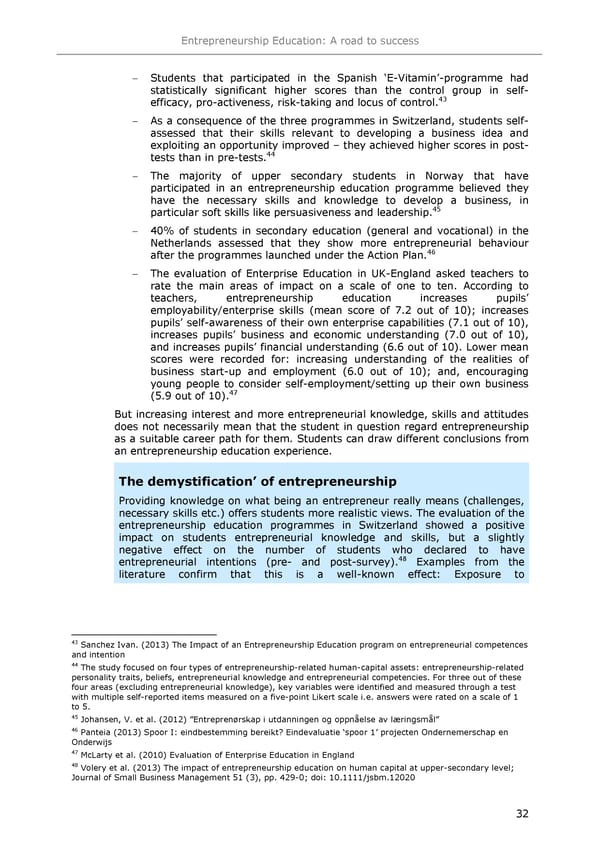Entrepreneurship Education: A road to success Students that participated in the Spanish 8E-Vitamin9-programme had statistically significant higher scores than the control group in self- 43 efficacy, pro-activeness, risk-taking and locus of control. As a consequence of the three programmes in Switzerland, students self- assessed that their skills relevant to developing a business idea and exploiting an opportunity improved 3 they achieved higher scores in post- 44 tests than in pre-tests. The majority of upper secondary students in Norway that have participated in an entrepreneurship education programme believed they have the necessary skills and knowledge to develop a business, in 45 particular soft skills like persuasiveness and leadership. 40% of students in secondary education (general and vocational) in the Netherlands assessed that they show more entrepreneurial behaviour 46 after the programmes launched under the Action Plan. The evaluation of Enterprise Education in UK-England asked teachers to rate the main areas of impact on a scale of one to ten. According to teachers, entrepreneurship education increases pupils9 employability/enterprise skills (mean score of 7.2 out of 10); increases pupils9 self-awareness of their own enterprise capabilities (7.1 out of 10), increases pupils9 business and economic understanding (7.0 out of 10), and increases pupils9 financial understanding (6.6 out of 10). Lower mean scores were recorded for: increasing understanding of the realities of business start-up and employment (6.0 out of 10); and, encouraging young people to consider self-employment/setting up their own business 47 (5.9 out of 10). But increasing interest and more entrepreneurial knowledge, skills and attitudes does not necessarily mean that the student in question regard entrepreneurship as a suitable career path for them. Students can draw different conclusions from an entrepreneurship education experience. The demystification9 of entrepreneurship Providing knowledge on what being an entrepreneur really means (challenges, necessary skills etc.) offers students more realistic views. The evaluation of the entrepreneurship education programmes in Switzerland showed a positive impact on students entrepreneurial knowledge and skills, but a slightly negative effect on the number of students who declared to have 48 entrepreneurial intentions (pre- and post-survey). Examples from the literature confirm that this is a well-known effect: Exposure to 43 Sanchez Ivan. (2013) The Impact of an Entrepreneurship Education program on entrepreneurial competences and intention 44 The study focused on four types of entrepreneurship-related human-capital assets: entrepreneurship-related personality traits, beliefs, entrepreneurial knowledge and entrepreneurial competencies. For three out of these four areas (excluding entrepreneurial knowledge), key variables were identified and measured through a test with multiple self-reported items measured on a five-point Likert scale i.e. answers were rated on a scale of 1 to 5. 45 Johansen, V. et al. (2012) =Entreprenørskap i utdanningen og oppnåelse av læringsmål= 46 Panteia (2013) Spoor I: eindbestemming bereikt? Eindevaluatie 8spoor 19 projecten Ondernemerschap en Onderwijs 47 McLarty et al. (2010) Evaluation of Enterprise Education in England 48 Volery et al. (2013) The impact of entrepreneurship education on human capital at upper-secondary level; Journal of Small Business Management 51 (3), pp. 429-0; doi: 10.1111/jsbm.12020 32
 Entrepreneurship Education Page 35 Page 37
Entrepreneurship Education Page 35 Page 37